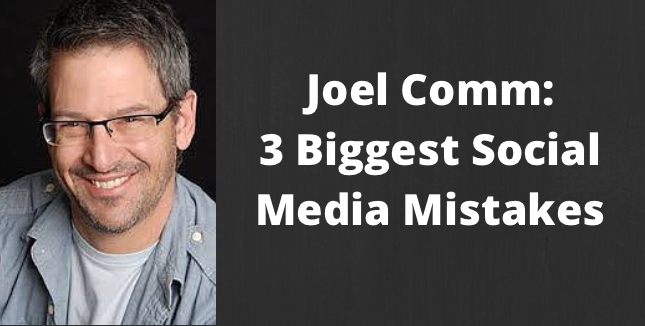Joel Comm is one of the world’s leading experts on web-based, money-making strategies. This is an excerpt from Joel’s chapter titled: Social Media Marketing Success Qualities in Success Secrets of the Social Media Marketing Superstars:
Social media, in particular, creates a unique context and mode of interaction. Just about everyone wants in on the benefits. Unfortunately, it’s also a particularly competitive environment; having the right characteristics, being determined and ready to act, is often not enough.
To succeed with social media, you also need the right information, and you need to be aware of what not to do, as well as knowing what to do. With that in mind, let’s review the top mistakes of social media marketing.
Mistake #1: Leading With Marketing Conversations
Many new social media marketers head into it as though it’s simply a place where they advertise themselves and their business. You see it happen all the time. People approach Twitter and Facebook, and they immediately friend people just to post links to their products and services. This makes it all about them, and they subsequently come off as being very selfish, and having an all-about-me attitude.
These people are missing the point, which is that all healthy businesses are built on relationships.
Using social media to advance your business goals does not change this fundamental rule. You must provide value for the prospect first. They will then, hopefully, become your customer.
There’s no better way to destroy your online reputation than to put your business on social media and just talk about yourself endlessly. People aren’t going to be interested. They’re not going to engage with you, and ultimately, you’re not going to make sales.
Mistake #2: Not Using Twitter Effectively
Twitter is the place where conversations are taking place, 24/7, 365 days a year. It is important to become relevant in the Twitter community and to seek to bring value by asking questions, answering questions, sharing news links, and sharing useful information in your particular market or niche.
After writing Twitter Power, I realized I had missed something key.
The mundane tweets actually connect us to people in a much broader sense than our more targeted tweets can.
They offer people a point of contact and a point of identification, which is really what we’re looking for in social media: relationships. We want to identify with people so that they like us for who we are, and they want to know us because of the value that we bring. They trust us because we’re the expert and then they want to do business with us. They want to pay us whether it’s a physical transaction, or for a product or service, or whether it’s just persuading someone to adopt an idea or a way of thinking. It is built on relationships. I call it the “like me, know me, trust me, pay me” process. It’s the key to building your business on a solid foundation and ensuring it’s there for the long haul.
Mistake #3: Not Having a Clear Goal
A lot of people just play with social media because it’s this new, bright, shiny object, but they don’t really know what they’re doing. By setting a goal, such as having more customers buying our products or services, we can then ask ourselves, “How can I leverage social media to make that happen?”
It’s no different than when someone walks into your brick and mortar store. If you greet them kindly, ask them how they’re doing, and get to know them a little bit, then you can serve their needs better. If they just walk in the door and you say, “Hey, you want to buy this?” you’re probably going to repulse them. It’s about building a relationship. When people keep that in mind and don’t look at it as a quick fix but as something more long-term, they realize that it’s not as much like visiting a website as it is like moving into a neighbourhood, creating relationships with your neighbours, and seeking to be an asset to the community.
It’s like Zig Ziglar said, “People don’t care how much you know until they know how much you care.”
That’s an axiom that proves true across the whole of human nature. Just because we’ve got cool technology with bright, shiny objects, doesn’t change who we are at our core.



